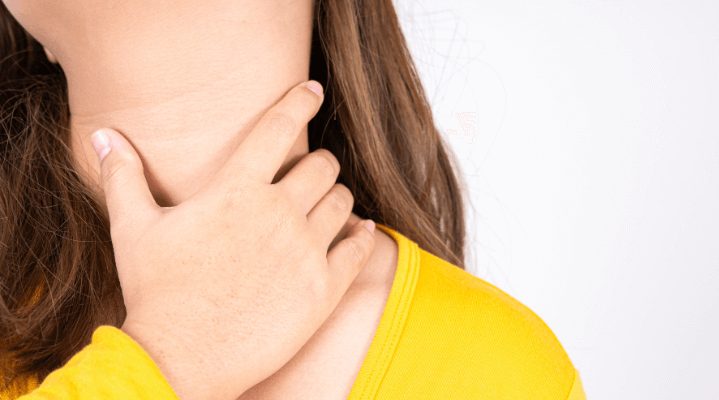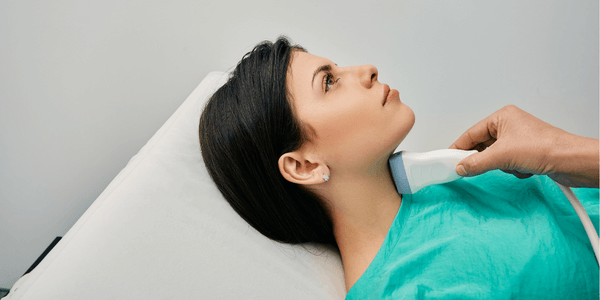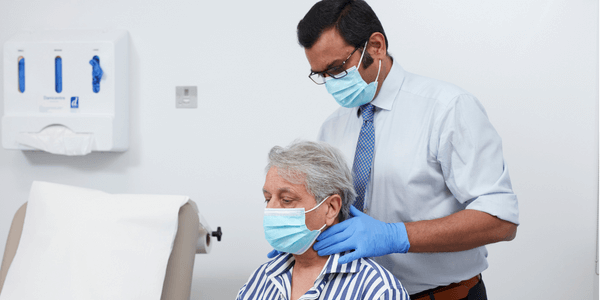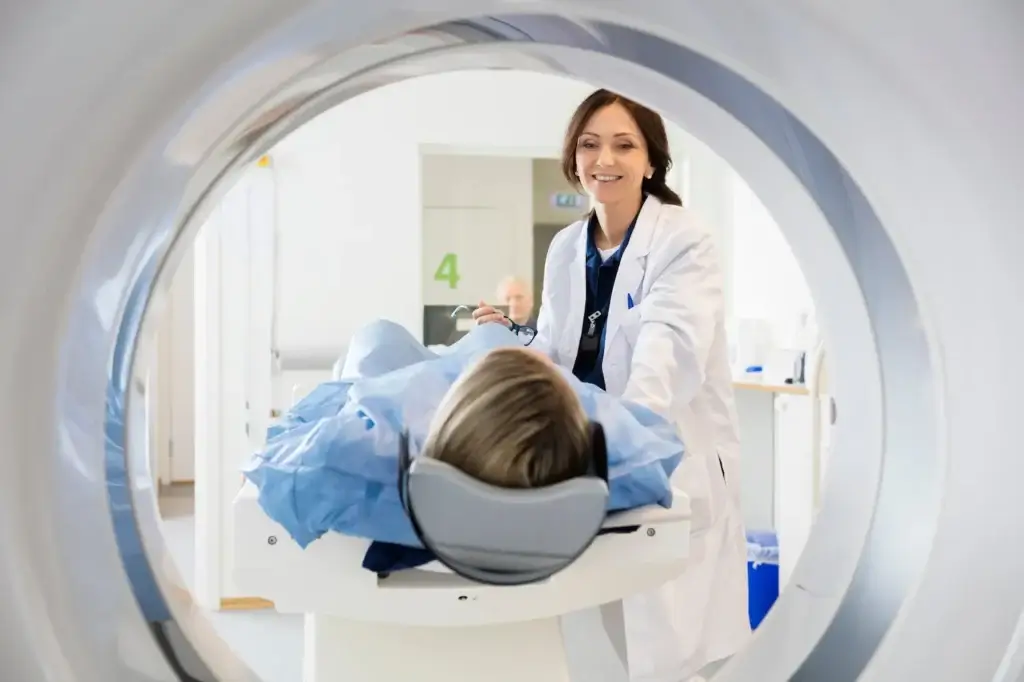
In this article, King Edward VII Hospital’s consultant Miss Aimee Di Marco, an Endocrine Surgeon who specialises in thyroid and neck nodules, explains what thyroid nodules are, who may experience them and treatment options.
What are thyroid nodules and how are they treated?
The thyroid gland is a small gland in the lower neck which can sometimes swell, causing a noticeable lump in the front of the neck called a goitre. It produces thyroid hormone which has very important roles in different body systems.
Almost all thyroid glands contain a certain number of microscopic lumps, or nodules, that are too small to feel. Howhat thwever, around two thirds of adults develop larger nodules that become noticeable.
Thyroid nodules, also known as thyroid lumps, are five times more common in women as women generally go through hormonal changes in their lives including during the menstrual cycle, pregnancy and the menopause.
Developing a thyroid nodule can be upsetting, but in the vast majority of cases, they’re not serious and do not require any active treatment.
What is the thyroid gland?
The thyroid gland is located in the lower part of the neck and surrounds the trachea (known as the windpipe) and voice box. It’s a small, butterfly shaped gland that produces hormones called triiodothyronine, or T3, and thyroxine, or T4. T3 and T4 are required to support the body’s metabolism.
What are the symptoms of a thyroid nodule?
The most common symptom of a thyroid nodule is a visible but painless lump in the front of the lower neck, just off the centre, that moves up and down when you swallow
However, there are other symptoms that can accompany a neck nodule that should be investigated by a medical professional as soon as possible. These include:
- A rapid increase in the size of one nodule
- Enlarged lymph nodes in the neck
- A change in your voice such as hoarseness
- Difficulty swallowing or breathing
Most neck lumps are not found to be cancerous, but these accompanying symptoms need to be investigated to rule out thyroid cancer, especially if you have a family history of thyroid cancer or you’ve been exposed to radiation.

How is a thyroid nodule or lump investigated and assessed?
If you need to have a thyroid nodule investigated, your doctor will usually first carry out some blood tests. These will test for levels of certain vitamins and minerals such as vitamin D and calcium, as well as testing your thyroid function and for special thyroid autoantibodies. Specialist blood tests may also be needed if there is a family history of thyroid cancer.
You will also undergo an ultrasound scan on your neck, performed by a specialist head, neck and thyroid radiologist. Depending on the results of this, you may then have a biopsy taken of any suspicious nodules using a fine needle.
Some patients require a CT or MRI scan to provide extra information on the health of their thyroid, especially if there is a suspicion of thyroid cancer that might be invading the trachea or voice box. A CT or MRI scan may also be necessary if you have a very large nodule that’s growing behind the breastbone.
You may also need a radioactive iodine based scan which can help your doctor ascertain whether any nodules are producing too much or too little thyroid hormone.
How are benign thyroid nodules managed?
If your thyroid is affected by nodules and is under- or over-producing thyroid hormones, you will be referred to an endocrinologist, or hormone specialist. They will be able to prescribe thyroid replacement hormone or antithyroid hormone medications that will help to balance your thyroid hormone production.
Other treatments include radioactive iodine treatment, radiofrequency ablation (laser) treatment of the nodules or surgical removal of troublesome nodules. Your specialist doctor will discuss your treatment options with you.
Benign thyroid nodules are treated according to the effect they might be having on your health. If they’re causing you difficulties with breathing or swallowing, or if the nodule is growing behind the breastbone, then part or all of the thyroid gland may be removed. Radiofrequency ablation can be used if the nodules are relatively small.

How is thyroid cancer treated?
Around 5% of solitary thyroid nodules are found to be cancerous. The most common type of thyroid cancer, accounting for around 80% of all thyroid cancers, is called papillary thyroid cancer, and has the best prognosis.
In all cases, your individual results will be discussed by doctors in a specialist cancer group called MDTs to ensure that you get the best care. Thyroid cancers, unless very small, are usually treated with surgery to remove half or all of the thyroid gland. This may be followed up with radioactive iodine treatment, which after ingestion enters the bloodstream and kills thyroid cancer cells.
Thyroid surgery at King Edward VII Hospital
The Thyroid Surgeons at the King Edward VII Hospital have significant experience in managing complex thyroid cancers and large thyroid nodules that are growing behind the breastbone.
Our team regularly perform other types of head and neck cancer surgery and are skilled in performing neck lymph node clearances if necessary, preserving important nerves and major blood vessels.
During surgery, our specialist doctors routinely use nerve monitoring to help identify and preserve the nerves to the voice box, which are located very close to the thyroid gland. They also ensure that the parathyroid glands, which are also located very close to the thyroid gland and help to regulate calcium levels within the body, are also preserved.
Endoscopic examination of the voice box using an endoscope – a long, thin tube with a camera at the end that is gently passed into the throat and neck – is also performed before and after surgery to help ensure that the vocal cords and the nerves supplying them are fully functioning.
More information
- If you’re concerned about a lump in your neck, speak to your GP. (If you don’t have a GP, you can make an appointment with one of our private GPs.)
- Endocrine consultants at the King Edward VII Hospital Diabetes and Endocrinology Department specialise in the diagnosis, management and treatment of neck lumps and thyroid nodules.
Article Sections
Latest Hospital News
Should you wish to speak to our press team, please visit Press Enquiries




